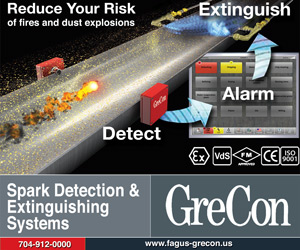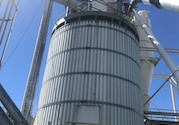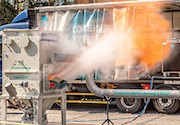| |
| |
 |
 |
| |
 |
|
@{mv_date_MMM d, yyyy}@ |
|
| |
 Dust Safety Week 2021 has arrived! All week long, Canadian Biomass and Canadian Forest Industries will be sharing articles focused on dust safety best practices, technical information and solutions for keeping pellet and sawmill operations and their operators safe.
» Read more...
Dust Safety Week 2021 has arrived! All week long, Canadian Biomass and Canadian Forest Industries will be sharing articles focused on dust safety best practices, technical information and solutions for keeping pellet and sawmill operations and their operators safe.
» Read more...
Canadian Biomass and Canadian Forest Industries have compiled a list of the latest dust collection and suppression equipment available for wood processing plants.
» Read more...
A Dust Hazard Analysis (DHA) is a comprehensive assessment of an industrial facility and its processes to identify areas where explosion and fire hazards may exist. This article answers some of the most common questions about conducting and using a DHA.
» Read more...
|
| |
 |
 |
| |
|
| |

Any dust event could have a devastating effect on workers, structures, and communities. Address dust safety hazards effectively with the NFPA Guide to Combustible Dust, a vital resource for everyone who deals with materials or processes that result in the accumulation of dust or small particles.
Written by experts, NFPA’s Guide explains the best practices and techniques for analyzing and mitigating risk on the job site with clear, easy-to-understand discussion of topics.
Available individually or as part of a set with NFPA 654, Standard for the Prevention of Fire and Dust Explosions from the Manufacturing, Processing, and Handling of Combustible Particulate Solids. These and all NFPA standards are available in Canada at Annex Bookstore.
>> Learn more |
| |
|
| |
 High-severity but latent hazards can fall off the radar. Fortunately, there are ways to catch lightning in a bottle and maintain control over these types of risks. Gorman Group’s David Murray discusses some of these complacency-busting tips.
» Learn more...
High-severity but latent hazards can fall off the radar. Fortunately, there are ways to catch lightning in a bottle and maintain control over these types of risks. Gorman Group’s David Murray discusses some of these complacency-busting tips.
» Learn more... |
| |
 When it comes to combustible dust explosion protection, if corners are cut or something is overlooked, it can not only result in a hazardous situation, but also create a false sense of security under the perception of complete, reliable protection. Simply put, when it comes to explosion protection, “good enough” should never be good enough.
» Learn more...
When it comes to combustible dust explosion protection, if corners are cut or something is overlooked, it can not only result in a hazardous situation, but also create a false sense of security under the perception of complete, reliable protection. Simply put, when it comes to explosion protection, “good enough” should never be good enough.
» Learn more... |
| |
|
| |
WPAC’s Safety Committee, in co-operation with WorkSafeBC, UBC’s Bioenergy Research Group, and Canadian Biomass, is hosting the Safety Foundation webinar series. The sixth of this free six-part Safety Foundation Webinar Series is focused on combustible dust and combustible gas.
» Read more...
|
Dust suppression has become an increasingly important challenge in biomass operations, with raised awareness and tighter regulatory standards both contributing motivations for handlers to find efficient, cost-effective methods of particle control. So what should you look for when selecting equipment?
» Read more...
|
|
Do you know what kind of dust is in your workplace? Finding accurate answers to this question – and many more – is more complex than it may seem, but is critical for keeping your workers safe. Conducting a risk assessment to identify the potential hazards of combustible wood dust in your workplace is the first step.
» Read more...
| | |
|
| |

|
| |
| |









